September has proven to be a volatile month for investment markets as economic headwinds continue to build. Inflation, and the response from central banks to control it, remains the key issue concerning investors. Central banks around the world have been mostly consistent in their statements and actions regarding the need to control inflation, and interest rates have been rising globally.
The increased cost of borrowing is a concern for investment markets as it discourages economic activity at a time when economies are not growing strongly. By adding further economic headwinds to a slowing economy, investors fear this may cause a recessionary environment. With uncertainty surrounding the future level of economic activity and how businesses may respond in that environment, investment markets have largely fallen throughout 2022.
Investors had hoped that inflation data might have softened, giving central bankers a potential motive to ease off on the previously signalled interest rate rises. This might have provided a boost to markets however this was not to be the case. In the US, August inflation was reported at 8.3%, above the consensus forecast of 8.1%.
A 0.2% difference may sound insignificant. But by missing on the high side, it suggests the speed of price rises is not falling as quickly as hoped. To investors’ dismay, this persistently high inflation only strengthened central bank arguments for further hawkish monetary policy. Investment markets reacted negatively to this data point with US stock markets suffering their worst declines since June 2020, a loss in value of $1.6 trillion in a day.
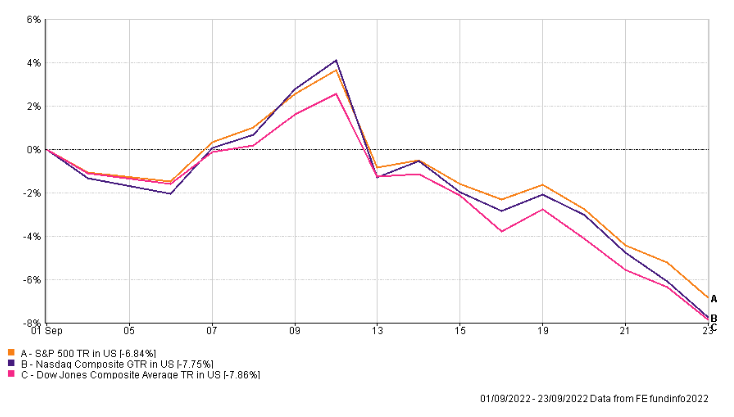
Not will they. But how much
With stubbornly high inflation, the debate has now changed in the lead up to central bank meetings. Instead of investors asking the question of IF interest rates will be increased. The question investors now ask is by how much. The US Federal Reserve ultimately delivered a further interest rate rise of 0.75% at its September meeting. The European Central Bank raised rates by the same margin earlier in the month, a record increase for the institution.
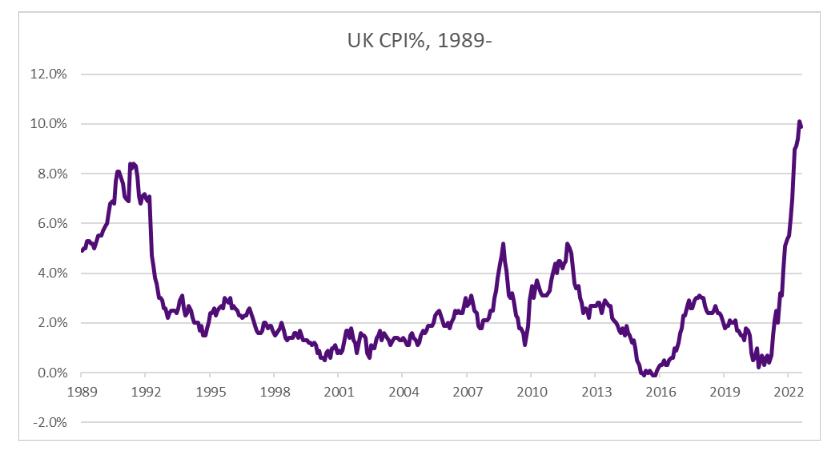
As inflation in the UK was reported as 9.9%% for August, a slight fall from the 10.1% recorded in July, the Bank of England raised rates by a further 0.5%. Minutes from the meeting suggested some members of the committee were more in favour of a larger increase of 0.75% in line with their European and American counterparts. It is a challenging period for the UK economy with inflation adding to a list of factors affecting economic growth. The Bank of England at the September meeting suggested they felt the economy was already in recession.
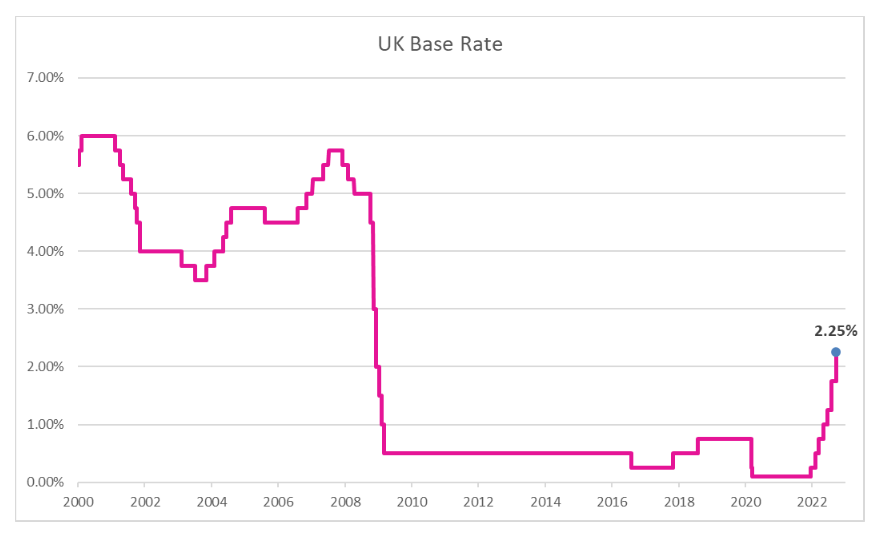
UK Government’s Gamble
The dour forecasts of the Bank of England are startlingly contrasted by the beaming optimism for growth displayed by the new UK government under Liz Truss. As the new Chancellor of the Exchequer, Kwasi Kwarteng, delivered his ‘mini-budget’ it was quickly apparent there was nothing ‘mini’ about the statement. It represented the biggest tax cut since Barber’s 1972 ‘dash for growth’ budget.
In terms of policy announcements, it is estimated they may represent upwards of an extra £120 billion in borrowing. A gamble that by throwing fiscal sustainability out the window, it might kickstart the flailing economy. While this may prove to have a suitably stimulating impact on economic growth, investment markets appear less convinced. In the lead up to the Chancellor’s statement, Pound Sterling had already fallen to a 37 year low. Following the announcement, Sterling fell below what could be seen as a symbolic level of $1.10 and approached parity in the following days.
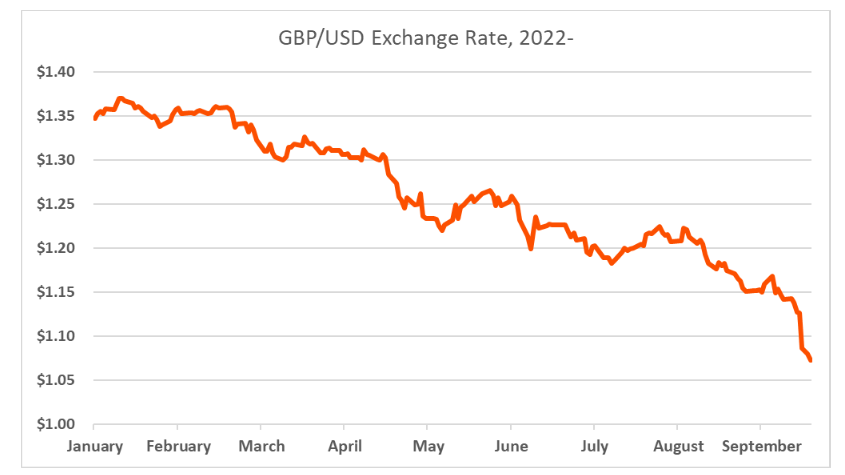
This decline is not entirely attributable to the Government’s statement. It continues a run of strong performance for the US Dollar which has appreciated in value against most major currencies throughout the year as demand for the world’s reserve currency has increased. However, the sharp move downwards following the statement suggests investors have lost further confidence in the UK economy and hold little appetite for UK investments.
Movements in fixed interest markets suggest bond investors were also unimpressed by the Chancellor’s statement. Bond yields have been rising throughout 2022 in line with rising inflation expectations and interest rates. However, following the Chancellor’s statement UK Government bond yields jumped sharply higher. The reason for this jump is investors expect these policies to simply add to inflationary pressures which would require further interest rate rises in the future. The consequence of this jump means the Government’s planned borrowing will come at an even greater cost; increasing uncertainty about the ability of the UK government to repay its debt.
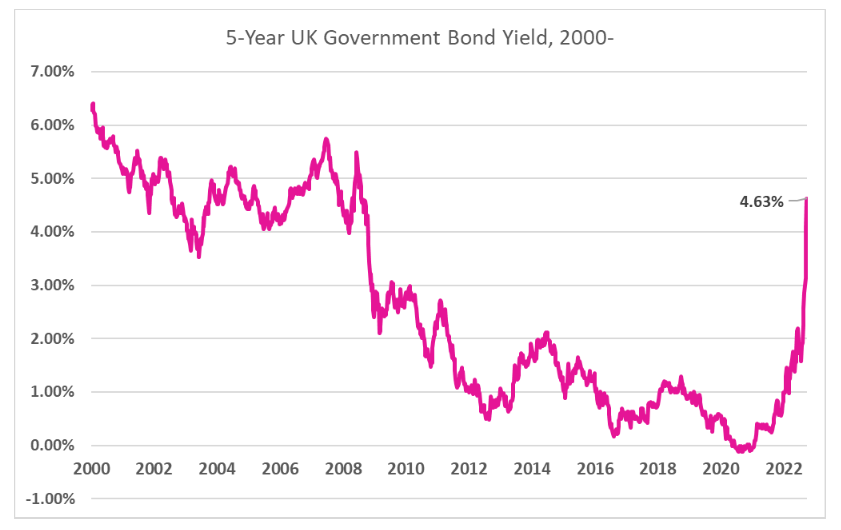
Fiscal policy, the day-to-day tax and spend of governments, very rarely works in perfect lockstep with Monetary policy, the use of interest rates to stimulate or cool growth and inflation. However, both parties usually are in pursuit of similar objectives. The change in direction for the UK government offers a clear dichotomy of priorities. The Bank of England are raising interest rates, attempting to cool inflation while admitting this may inhibit growth. In contrast, the UK government are gambling that these changes will stimulate growth with any resulting inflation, in their eyes, a manageable risk.
There is no short-term fix for the issues facing the economy. However the reaction of investment markets suggest they are not convinced the path charted by the UK government is the correct long-term course of action. Only time will tell whether the government’s gamble pays off.
Invitation
If you would like to discuss your financial plan and investment strategy, then we would love to hear from you. Get in touch with your Financial Planner here at Vesta Wealth in Cumbria, Teesside and across the North of England.
Reach us via:
t: 01228 210 137
This content is for information purposes only. It should not be taken as financial or investment advice. To receive personalised, regulated financial advice regarding your affairs please consult your Financial Planner here at Vesta Wealth in Cumbria, Teesside and across the North of England.

